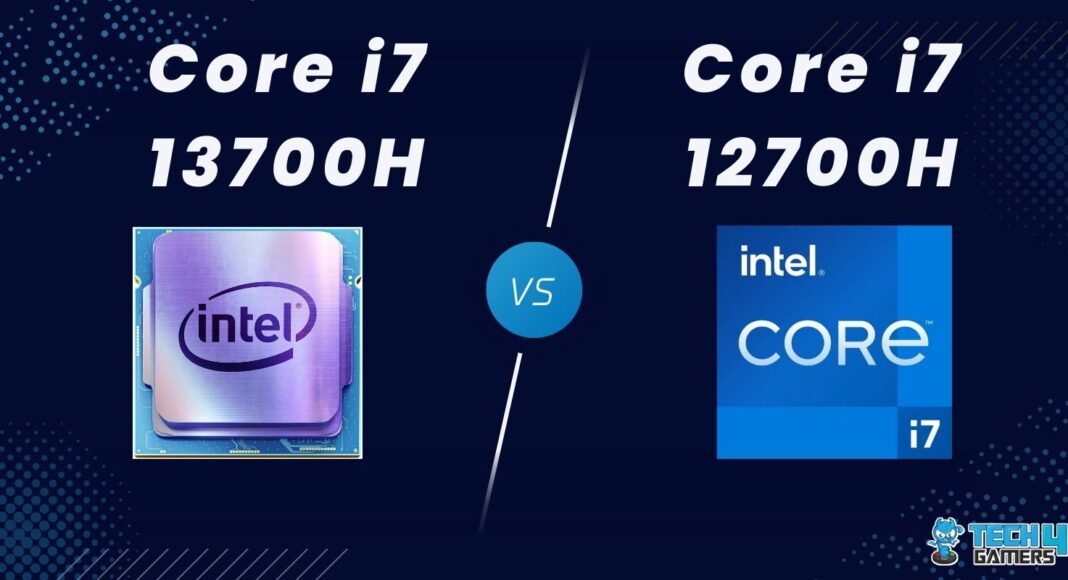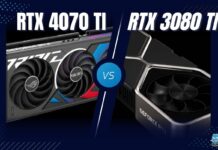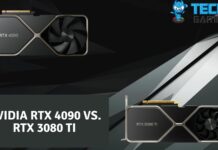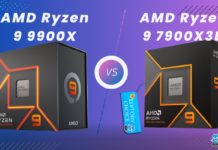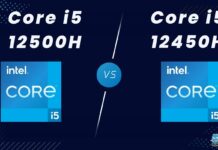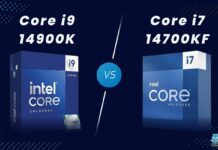Intel Core i7 13700H
Rated: 7/10
Intel Core i7 12700H
Rated: 7/10
Pros And Cons
| CPU | Pros | Cons |
|---|---|---|
| Intel Core i7 12700H | ✅ Performance rivaling newer GPUs ✅ Much better price | ❌ Lower battery efficiency |
| Intel Core i7 13700H | ✅ Better Overall Performance ✅ Better battery efficiency | ❌ Worse Price-to-Performance Ratio |
- In our benchmark tests, the i7 13700H was about 7% faster than the 12700H, though the older processor beat the 13700H in some benchmarks.
- The 13700H was about 6% more power efficient in our tests with an external power monitor.
- A machine with the i7 12700H can be had for significantly less than the 13700H because of its slight age.
Comparison Table
| Model | Intel Core i7-13700H | Intel Core i7-12700H |
|---|---|---|
| Vendor | Intel | Intel |
| Type | Laptop | Laptop |
| Instruction set | x86-64 | x86-64 |
| Codename | Raptor Lake | Alder Lake |
| Integrated GPU | Iris Xe Graphics (96EU) | Iris Xe Graphics (96EU) |
| Multiplier | 24x | 23x |
| L1 Cache | 80K (per core) | 80K (per core) |
| L2 Cache | 2MB (per core) | 1280K (per core) |
| L3 Cache | 24MB (shared) | 24MB (shared) |
| Unlocked Multiplier | No | No |
| Integrated Graphics | Intel Iris Xe Graphics (96EU) | Intel Iris Xe Graphics (96EU) |
| GPU Base Clock | 300 MHz | 300 MHz |
| GPU Boost Clock | 1500 MHz | 1400 MHz |
| Released | January 3, 2023 | January 4, 2022 |
Core i7 12700H Vs Core i7 13700H – Architectural Differences
- Clock Speeds: The 12700H most notably differs from the 13700H in clock speeds. The older processor has a base clock of around 1700MHz, which boosts up to 4700MHz. The 13700H, however, has a base clock of 1800MHz, whereas its boost clock goes all the way up to 5000MHz.
- Lithography: Both these processors have fairly advanced processing nodes of 10nm, though they are not as good as the smaller process nodes we have seen on the desktop side and from offerings from AMD.
- Core Counts: Both these processor uses Intel’s new and fairly revolutionary big.LITTLE hybrid core architecture aims to give users more cores without sacrificing the efficiency of the processors at hand.
The 13700H and 12700H have 8 efficiency cores and 6 performance cores allowing the processors to pack a serious punch without overbearing power. These add up to 20 threads which is a huge number compared to processors from a couple of years ago. - Cache: The i7 12700H and 13700H boast an L3 cache of 24MB, allowing easy access to your most vital data. This number is fairly impressive for a laptop processor.
- TDP: These processors are rated for a TDP of 45 watts at their base, with the maximum turbo power being around 115 watts, though in reality, they can go higher or lower based on the power limits of your exact machine.
With the recent improvements to computer hardware both on the mobile and desktop side, consumers often ask whether they want to get the latest and greatest technology or stick with heavily discounted yet very capable generation-old tech. This is the exact question we aim to answer with our comparison of the Core i7 13700H vs Core i7 12700H to see which chip is better suited to your day-to-day life.
Productivity Benchmarks
Having seen the improvements the newer chip has brought in Intel’s yearly revision, this part of the comparison will focus on showing the performance difference between the two chips in a variety of benchmarks.
Cinebench R23
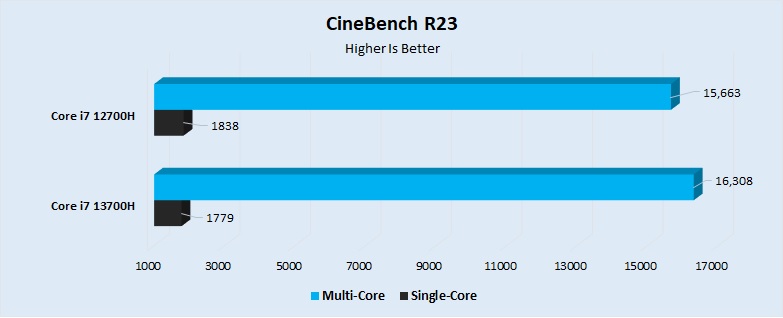
- Starting off these tests, we have Cinebench R23, a popular benchmark with reviewers and consumers alike. In the single-core part of the test, the 13700H had about 1779 points, whereas the 12700H was about 3% slower, with a performance of about 1838 points.
- These faster cores combined give the processor a small 4% boost in multi-core performance over the 12700H. The 13700H had about 16308 points, compared to the 15663 points on the 12700H.
Geekbench 5.4
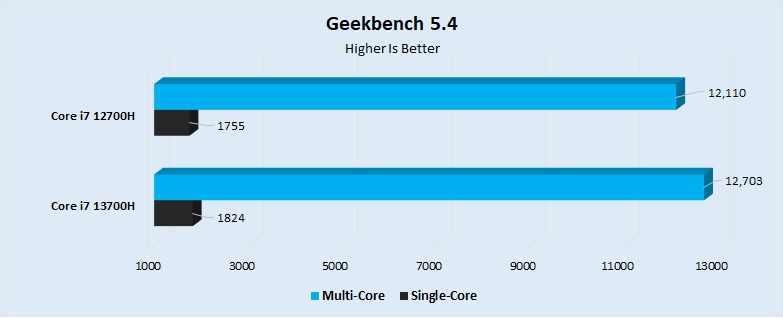
- In the slightly old Geekbench 5.4 benchmark, we saw a similar performance as we did in the last benchmark; that is, the 13700H got small victories. In the single-core test, the 13700H had a 4% better performance than the 12700H, scoring 1824 points, compared to 1755 points for the 12700H.
- Moving on to the multi-core score, the 13700H beat the 12700H by about 5%. The 12700H had a slightly lower score of 12110 points compared to the 12703 points of the 13700H.
3DMark
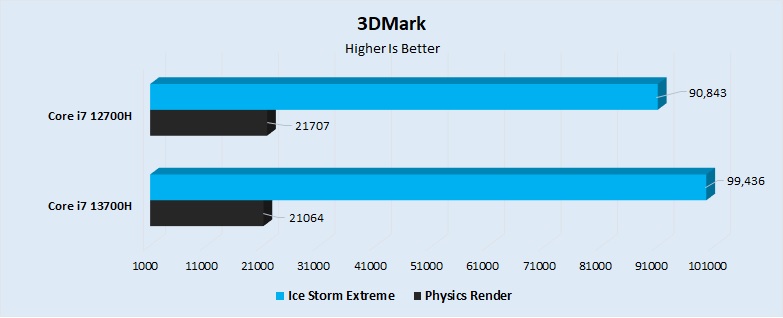
- The 3DMark 11 benchmark makes particular use of your CPU, relying heavily on compute power for its physics renders. This test had the i7 12700H scoring around 21707 points against the lower 21064 points of the 13700H.
- In the 3DMark Ice Storm Extreme Physics benchmark, we saw that the pattern in the last 3D mark benchmark was inconsistent, with the 12700 getting around 90843 points, whereas the 13700H hovered around 99436 points.
Blender
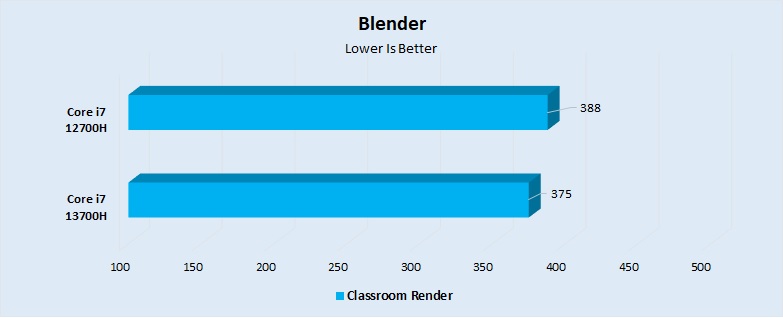
- Moving on to a professional software that many people buying these products will use, Blender ran slightly better on the newer chip.
- The i7 12700H finished the Classroom render in about 388 seconds, whereas the 13700H was faster, with the render finishing in about 375 seconds.
7-Zip
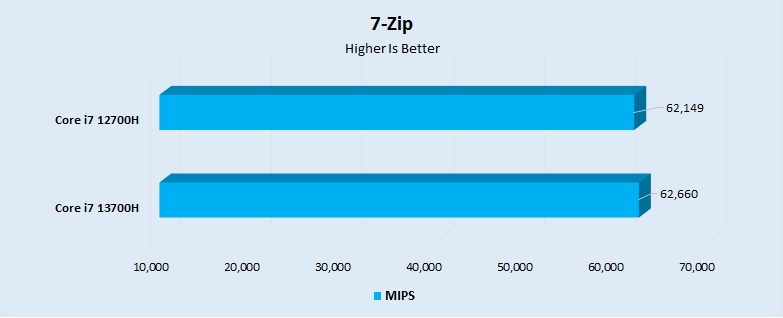
- The 7-Zip decompression test ran almost equivalently on both processors, with the 13700H edging out by a single percent of performance.
- The 12700H had a performance of about 62149 MIPS, whereas the 13700H came out ever so slightly ahead with a performance of 62660 MIPS.
WinRAR
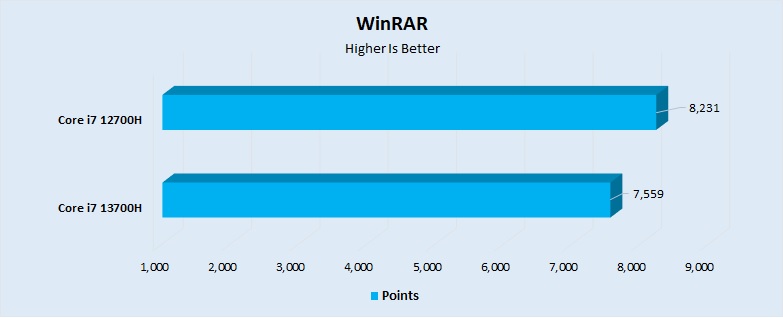
- Another encryption test, WinRAR, showed us how the older hardware still packs a punch, even compared to its newer sibling.
- The 12700H had a performance of 8231 points, compared to 7559 points from the i7 13700H. This works out to a difference of about 8%.
HWBOT x265
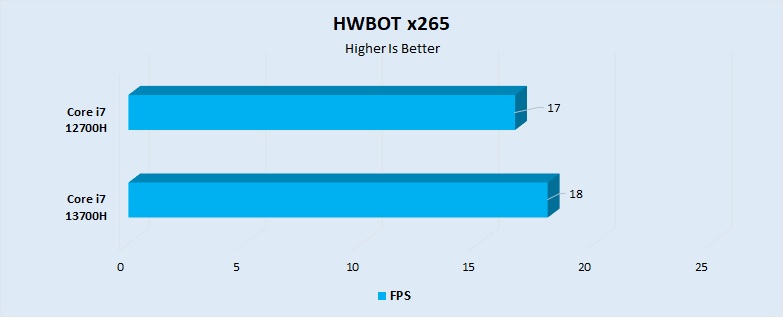
- Both processors performed adequately in the HWBOT x256 benchmark on the 4k preset, though the 13700H was ahead by a noticeable margin.
- The 13700H had a framerate of 18 FPS, whereas the 12700H kept up with the newer processor with around 17 FPS.
Power Consumption
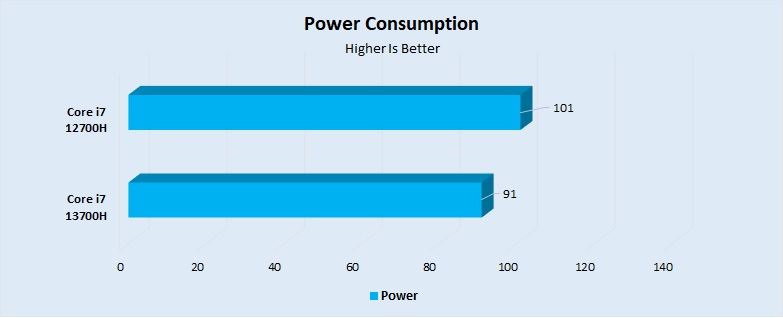
- Using an external monitor while utilizing the Prime95 software, we saw that the 13700H was also slightly more power efficient than the 12700H.
- The 13700H drew about 91 watts, whereas the 12700H drew closer to 101 watts. A difference like this can make a substantial improvement in the battery life of your system.
Core i7 13700H Vs Core i7 12700H – Which One Is Good For You?
Intel Core i7 13700H: We can conclude that the i7 13700H brings significant improvements to the i7 mobile chip series, including better energy efficiency and more power. This processor also enjoys being more modern than its competitor in terms of fabrication processing technology.
Intel Core i7 12700H: Our analysis shows that the i7 12700H is a reliable and high-performing processor that has continued to keep up with newer offerings on the market. This processor may not be up to the mark against the mighty Intel i7 13700H, but it sure provides some perks against the newly introduced chips.
In our opinion, those seeking a state-of-the-art processor should consider the i7 13700H, while those seeking a fast and affordable CPU should consider the i7 12700H. This choice is up to the consumers based on their demands and requirements.
Frequently Asked Questions
Yes, both processors are based on Intel’s 10nm lithography.
Yes, though the one in the newer GPU has a clock speed of 1500MHz compared to 1400MHz on the older model.
The Ryzen 7 6800H is a good equivalent to the 12700H from Intel, though it does differ in some aspects, like the architecture.
More From Core i7 12700H:
More From Core i7 13700H:
Thank you! Please share your positive feedback. 🔋
How could we improve this post? Please Help us. 😔
[Comparisons Expert]
Shehryar Khan, a seasoned PC hardware expert, brings over three years of extensive experience and a deep passion for the world of technology. With a love for building PCs and a genuine enthusiasm for exploring the latest advancements in components, his expertise shines through his work and dedication towards this field. Currently, Shehryar is rocking a custom loop setup for his built.
Get In Touch: shehryar@tech4gamers.com


